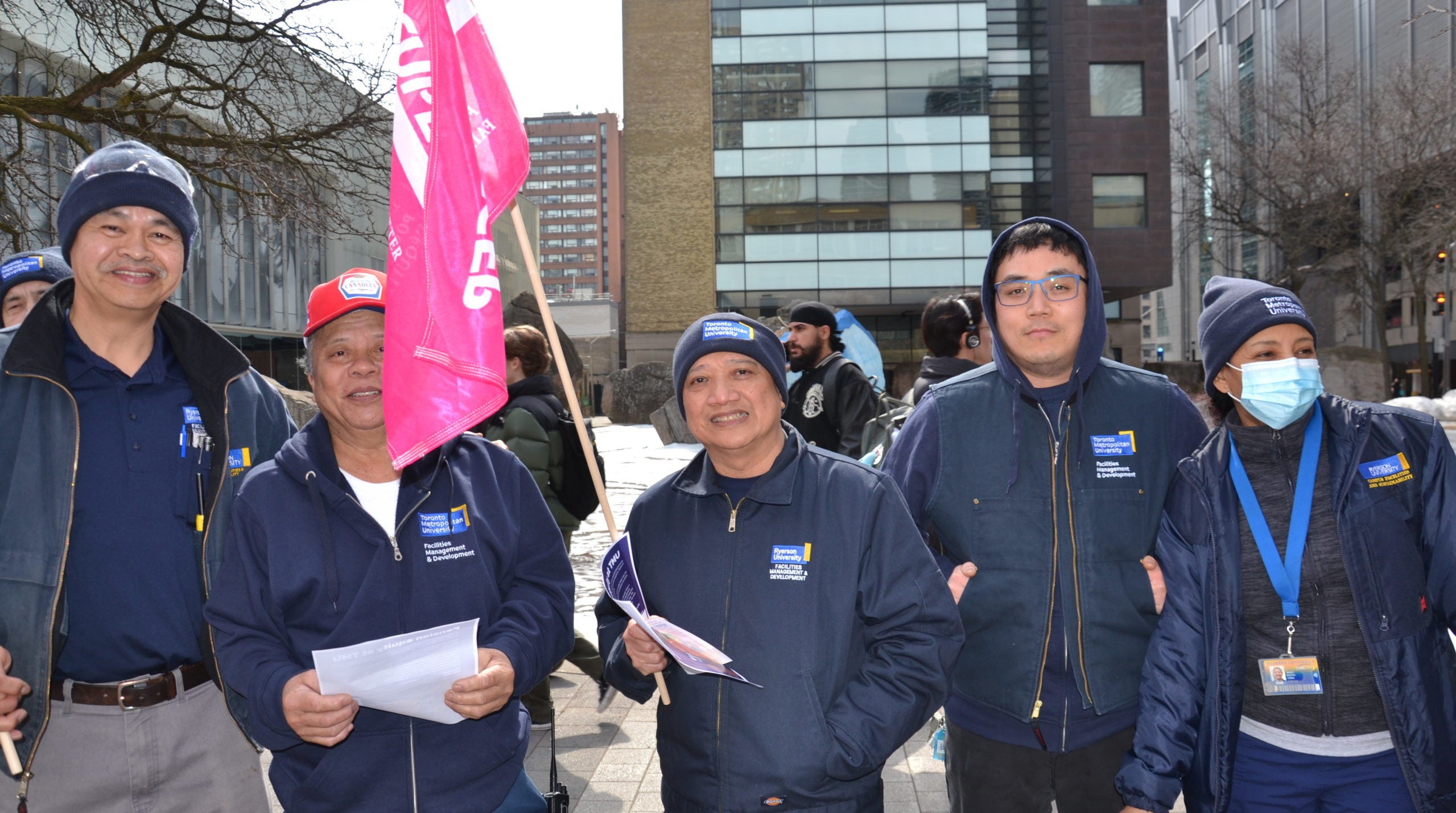Last Update: March 30, 2023
General
What happens if we go on strike?
In the event a strike becomes necessary and is called by your Negotiating Committee, every CUPE 233 member will be immediately contacted with a notice that we are on strike. You will have been assigned a picket location and picket captain in advance.
In the event of a strike, it is crucial that every CUPE 233 member stops reporting to work and participates to make the strike as strong as possible.
You will be assigned strike duties such as picketing and leafleting (more on this will be sent at a later date).
What if TMU uses replacement workers to do our usual work duties?
CUPE 233 takes the position that no bargaining unit work ought to be done in the event of a labour disruption, and will take the position that the university must not employ replacement workers, also known as “scabs” or strike-breakers, to do your work, except for emergencies and health and safety situations that require a response.
A scab is a worker who engages in any strike-breaking activity or works for the employer during a legal labour dispute. Doing this is the worst form of anti-union activity. Crossing a picket line shows complete disrespect for co-workers and the democratic decision that the membership has made to go on strike.
How long will a strike last?
The more united and well-organized we are, the shorter the strike will be. The most important part of winning a strike is for each and every member not to report to work, and instead to participate in the strike. We only need to withhold our labour one day longer than the employer can function without us.
Will I get in trouble for participating in a strike?
You have a protected legal right to strike. Management cannot legally discipline members for supporting their union. Your union representatives will support you if any such action is taken by management.
Strike Pay and Benefits
Do I qualify for strike pay?
In the event of a strike, to qualify for strike pay you need to:
- Be an active, dues-paying CUPE 233 member.
- Have completed the Strike Pay Form (more details will be shared at a later date).
- Participate in strike duties as assigned by your strike committee (more details will be shared at a later date).
How much is strike pay?
Strike pay is a maximum of $300/week for performing 4 hours a day (20 hours a week) of strike duties. Strike pay is not taxable income. Strike pay will be provided by cheque to you most likely by your picket captain.
What happens to my benefits in the event of a strike?
The CUPE Strike Fund will pay both the employer and employee share for the existing level of benefits for all members participating in the strike. Therefore, your existing level of benefits are expected to continue as normal.
What if I am on vacation when the strike starts?
If you are on approved vacation prior to the time the strike begins, TMU should honour the remainder of your approved vacation. However, you are encouraged to cancel your vacation and participate in the strike because the stronger the participation, the more likely that a fair agreement will be reached. Once the strike begins and until it ends, you cannot go on vacation.
What happens if I am on sick leave/short-term disability when a strike starts?
If you are on approved sick leave/short-term disability prior to the strike your sick leave/short-term disability benefits should continue.
Am I eligible for Employment Insurance (EI) sickness benefits during a strike or lockout?
Maybe, if you can show that your leave was anticipated and arrangements for it were made prior to the strike. If you were on short-term sick leave before the strike that may demonstrate that your leave was anticipated. If your sickness wasn’t anticipated or starts during the strike you will not qualify for EI sickness benefits.
Strike Duties
What are strike duties?
Strike duties include activities like picketing and leafleting and some other support roles as determined by the strike committee. Normal picket shifts are four (4) hours per day, five (5) days per week, Monday to Friday. Members are asked to complete one 4-hour shift a day for a total of five shifts a week (20 hours). Members who are unable to perform a minimum of twenty (20) hours per week of picket duty could be eligible to be paid a prorated amount of picket pay, based on hours picketed if approved by the Strike Committee.
You will need to ensure that you sign in and out of your daily strike duty shift with your assigned picket captain so that your hours are recorded.
Can I perform a double shift of 8 hours a day?
For the strike to be effective, members need to be on the picket line every day. If you need to request a different schedule as an accommodation in your Strike Pay Form, please contact us and the Strike Committee will review and approve it on a case-by-case basis.
What happens if I get sick during the strike and cannot fulfill my strike duties, will I receive strike pay?
If you are sick and cannot report to your strike duties, you should contact your picket captain who will communicate with your Strike Committee. You should not picket if you have COVID or other symptoms of illness as you could potentially make other members sick. However, as soon as you are well again you should return to picket duties. If you are sick, you will receive strike pay for your missed shift, if you can provide reasonable proof of illness.
If you have any questions or concerns that haven’t been addressed in the above FAQ please contact cupelocal233@gmail.com.
